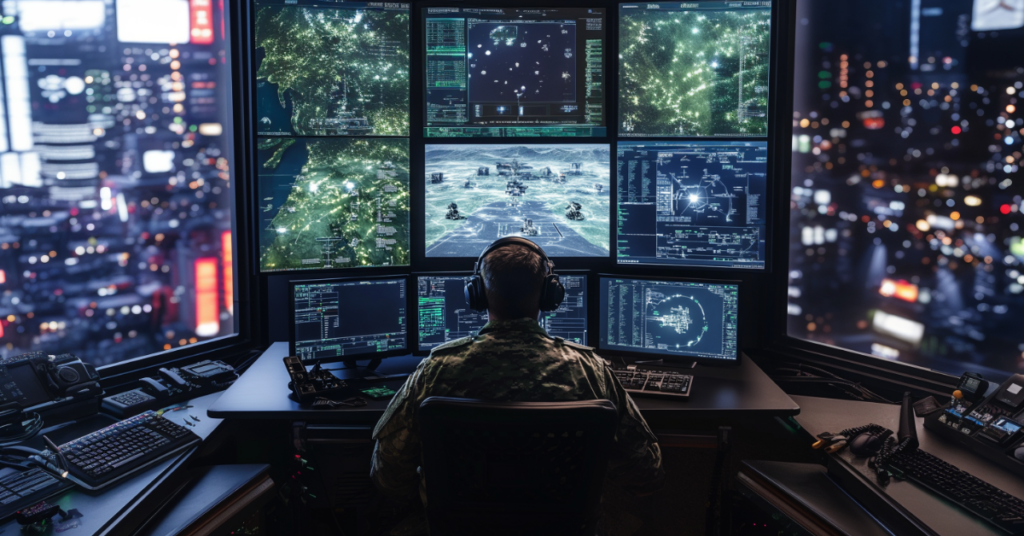Venture-backed startups are securing major defense contracts and outpacing traditional firms in AI-driven warfare development. With advancements in AI pilots, autonomous systems, and directed-energy weapons, startups are addressing critical military capability gaps.
A New Era in Military Technology
The United States Department of Defense (DoD) is focusing on venture-backed firms to develop next-generation military solutions as traditional contractors struggle with bureaucratic delays, slower innovation cycles, and cost overruns. Startups are deploying AI for battlefield decision-making, logistics optimization, and autonomous surveillance, enhancing real-time threat response. Directed-energy weapons, once confined to research labs, are now being tested for real-world deployment. Quantum computing and AI-driven cybersecurity are strengthening military networks against evolving threats.
China’s rapid advancements in autonomous systems and AI-driven combat applications have fueled concerns within the Pentagon, prompting urgent investment in U.S. startups to maintain a technological edge (Easley, 2024). While they lead in AI and directed-energy solutions, Europe is investing in homegrown firms like Helsing and Quantum Systems to build regional defense capabilities. Meanwhile, China is expanding its military AI infrastructure (European Commission, 2025; Easley, 2024). With rising geopolitical tensions, global militaries are racing to adopt emerging technologies at scale.

The Rise of Private Sector Warfare
Several venture-backed companies are at the forefront of defense tech innovation, pioneering everything from AI chips to autonomous drones. These startups have attracted significant investment, with some earning DoD endorsements and securing military contracts.
SiMa.ai: Edge AI for the DoD
A Silicon Valley startup specializing in embedded machine learning chips, SiMa.ai achieved “awardable” status in February 2025 on the DoD’s Tradewinds Solutions Marketplace. This designation allows its technology to be directly procured by U.S. defense agencies. The company’s low-power MLSoC (Machine Learning System-on-Chip) delivers high-performance AI at the edge, making it ideal for drones, robotics, and surveillance systems (SiMa Team, 2025). In a Tradewinds demo accessible to government users, its platform demonstrated superior anomaly detection, automated runway takeoff, and surveillance capabilities for military applications. The “awardable” status reflects the Pentagon’s confidence in the edge AI system’s ability to deploy smart vision and autonomous decision-making on the battlefield with minimal integration hurdles. With $270 million in funding, the company is among the commercial AI firms gaining traction in defense applications.
Epirus: High-Power Microwave Defense
Los Angeles-based Epirus has emerged as a leader in counter-drone technology through directed-energy weapons. In March 2025, the company raised a $250 million Series D round led by 8VC and Washington Harbour Partners LP. This funding, which brings its total raised above $550 million, will scale production of its flagship Leonidas high-power microwave (HPM) weapon (Metinko, 2025).
Leonidas is essentially a microwave cannon that can disable swarms of drones and other electronics by emitting targeted EMP bursts. The technology offers a “one-to-many” defense, taking down multiple UAVs at once, unlike guns or lasers that hit one at a time (Metinko, 2025). The company has already delivered four HPM prototypes to the U.S. Army under a $66 million contract, as the Army explores the technology to protect troops from the kind of mass drone attacks seen in Ukraine. General Dynamics Land Systems joined the latest funding round as a strategic investor (Breaking Defense, 2025). This move hints at integrating Leonidas on vehicles for short-range air defense while expanding into international and commercial markets (Metinko, 2025).
With the Pentagon warning that drone swarms create a serious capability gap at bases and battlefields, demand for these microwave weapons is rising, with some even comparing them to a “force field” against drones (Breaking Defense, 2025). The startup’s rapid rise and $1+ billion valuation illustrate the market impact of directed-energy tech becoming practical for deployment (Metinko, 2025).
Shield AI: Autonomy and Swarm Intelligence
San Diego-based SHIELD AI has quickly become one of the highest-valued defense tech startups by pioneering AI pilots for military drones and aircraft. In March 2025, the company closed a $240 million Series F-1 round at a $5.3 billion valuation. The raise drew strategic investments from L3Harris Technologies and Hanwha Asset Management Co., Ltd., alongside venture firms like Andreessen Horowitz, to scale its core product: Hivemind Enterprise (Shield AI, 2025).
Hivemind is an AI-powered autonomy software stack that enables drones and even crewed jets to fly and fight without GPS, communications, or human control. The platform functions as an “AI pilot,” allowing defense contractors and militaries to integrate autonomy into their systems. Its tools have already proven themselves in a series of military demonstrations. Hivemind has autonomously flown F-16 fighter jets, large drones like the MQ-20 Avenger, and small quadcopters that cleared buildings and tunnels for U.S. and Israeli special forces. The company’s V-BAT drone (a vertical-takeoff UAV) can operate in GPS-denied environments and was recently selected as the first ship-launched drone for Japan’s navy (Shield AI, 2025).
The company also partnered with L3Harris in 2024 to integrate its autonomy into existing defense platforms and later collaborated with Palantir Technologies on the “Warp Speed” initiative, combining AI pilots with battlefield software. From swarming drones to autonomous F-16s, its advancements highlight how rapidly AI-driven warfare is evolving. With strong investor support, the company is proving that large-scale deployment of this technology is becoming a reality (Shield AI, 2025).
Anduril: AI Networks and Counter-Drone Dominance
Anduril Industries, a defense technology firm founded by Palmer Luckey, the creator of Oculus VR, has solidified its status as a defense “unicorn” by delivering cutting-edge surveillance systems, autonomous drones, and AI command networks. In March 2025, the company beat out nine competitors to win a 10-year, $642 million contract with the United States Marine Corps for counter-drone systems. This win, on top of a $200 million contract awarded in late 2024, tasks the firm with protecting Marine bases from small drones (like those seen in Ukraine).The solution falls under the Marine Corps’ Installation-Counter UAS program and will network sensors and effectors across bases to detect and defeat Class 1–2 drones (under ~55 lbs) (Loh, 2025).
Its edge in this competition comes from Lattice AI, an operating system that fuses data from radars, cameras, and RF sensors, and deploys countermeasures such as jammers and interceptors in real-time. The company also provides its own hardware, including the Ghost autonomous drone family for persistent surveillance and intercept missions. For instance, the Army has been testing Ghost X drones and even fast-tracked them for mass procurement as part of the Pentagon’s new “Replicator” initiative. The firm’s ability to integrate AI, software, and hardware into turnkey solutions positions it as a “Trusted Disruptor” rivaling traditional primes (Loh, 2025).
With billions in contracts and a $7 billion valuation, the company has positioned itself as a leader in AI-driven battlefield awareness and counter-drone defense. Its ability to integrate AI into sensor networks and deploy real-time countermeasures has set a new standard for next-generation military systems (Loh, 2025).
Additional Startups Gaining Traction
- Saronic Technologies: An autonomous naval vessels maker, raised $600 million in a Series C at a $4 billion valuation. The company builds uncrewed surface vessels for military operations, capitalizing on increased Navy investment in unmanned platforms (Metinko, 2025).
- Castelion: A weapons technology startup that secured a $100 million Series A round to develop next-generation munitions, reflecting investor demand for companies solving precision weapons and supply chain challenges (Metinko, 2025).
- CHAOS Industries: Raised $70 million in initial funding, followed by a $145 million Series B. The company focuses on advanced defense systems, including hypersonic defense and AI-enabled command platforms (Metinko, 2025).
- Parry Labs: Specializing in open-architecture mission systems, raised $80 million to advance battlefield IoT and avionics, accelerating upgrades for military aircraft and ground vehicles (Metinko, 2025).
- Overland AI: Achieved “awardable” status on the Tradewinds marketplace in 2024 for its off-road autonomous driving software. The company’s OverDrive autonomy stack enables vehicles to navigate rugged terrain without GPS (Overland AI, 2024).
- D-Wave: A pioneer in quantum computing, designated as an “awardable” DoD vendor in late 2024. D-Wave’s quantum annealing computers support military applications such as scheduling, routing, and encryption (TipRanks, 2024).
Investment in defense startups remains strong, with venture-backed firms raising approximately $3 billion in 2024, an 11% increase from the previous year (Metinko, 2025). As startups continue to win major defense contracts, traditional contractors are under pressure to move faster and cut costs. The Pentagon’s reliance on startups for critical defense technologies is accelerating innovation while changing how military contracts are awarded and fulfilled.
Follow me, Harold Hare, for global trends signaling industry disruption.
References
Breaking Defense. (2025, February 18). High-power microwave ‘force field’ knocks drone swarms from sky. Breaking Defense. https://breakingdefense.com/2025/02/high-power-microwave-force-field-knocks-drone-swarms-from-sky/
Easley, M. (2024, December 18). China’s drone modernization efforts close to ‘matching US standards,’ Pentagon report says. DefenseScoop. https://defensescoop.com/2024/12/18/chinas-drone-modernization-efforts-close-to-matching-us-standards-pentagon-report-says/
European Commission. (2025, January 30). European Defence Fund: Over €1 billion to drive next-generation defence technologies and innovation. Directorate-General for Defence Industry and Space. https://defence-industry-space.ec.europa.eu/european-defence-fund-over-eu1-billion-drive-next-generation-defence-technologies-and-innovation-2025-01-30_en
Loh, M. (2025, March 5). Anduril beat 9 competitors to snag a $642 million anti-drone contract for the US Marine Corps. Business Insider. https://www.businessinsider.com/anduril-defense-startup-beat-competitors-642-million-deal-marine-corps-2025-3
Metinko, C. (2025, March 5). Defense startup Epirus secures $250M for anti-drone tech. Crunchbase News. https://news.crunchbase.com/defense-tech/startup-epirus-secures-funding-anti-drone-tech-8vc/
Overland AI. (2024, July 31). Overland AI assessed “Awardable” for Department of Defense work in the CDAO’s Tradewinds Solutions Marketplace. Overland AI. https://www.overland.ai/news/overland-ai-assessed-awardable-for-department-of-defense-work-in-the-cdaos-tradewinds-solutions-marketplace
Shield AI. (2025, March 6). Shield AI raises $240M at $5.3B valuation to scale Hivemind Enterprise, an AI-powered autonomy developer platform. Shield AI. https://shield.ai/shield-ai-raises-240m-at-5-3b-valuation-to-scale-hivemind-enterprise-an-ai-powered-autonomy-developer-platform/
SiMa Team. (2025, February 4). SiMa.ai assessed “Awardable” for Department of Defense work in the CDAO’s Tradewinds Solutions Marketplace. Sima.ai. https://sima.ai/sima-ai-assessed-awardable-for-department-of-defense-work-in-the-cdaos-tradewinds-solutions-marketplace/
Sraders, A. (2025, January 22). The European defence techs working with governments. Sifted. https://sifted.eu/articles/european-defence-startups-government-contracts
TipRanks. (2024, October 31). D-Wave Quantum gains recognition in defense sector. TipRanks . https://www.tipranks.com/news/company-announcements/d-wave-quantum-gains-recognition-in-defense-sector




